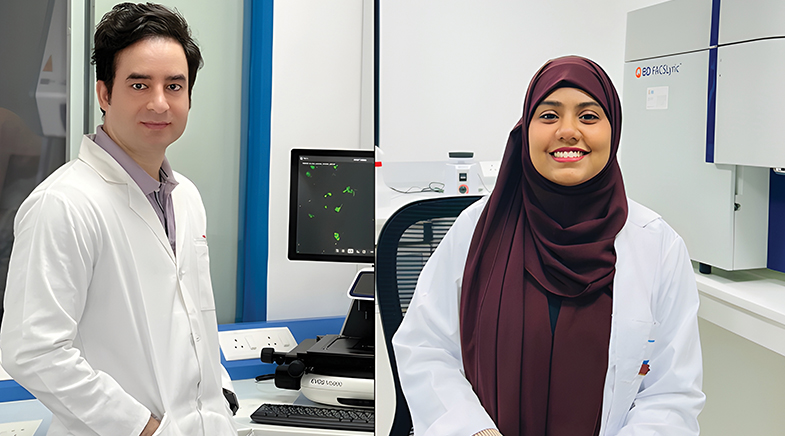Kill pill
-
- from Shaastra :: vol 04 issue 08 :: Sep 2025

These cells are mercenary, with a licence to kill. Ironically, they could be lifesavers.
It forms part of the body's first line of defence, along with the skin and mucous membranes. As it patrols the bloodstream, this lean and mean battalion intercepts any cell that appears to be a threat — whether pathogen or a cell gone rogue. Its arsenal includes perforin to tear open the enemy cell and granzymes to destroy the innards. It also triggers the release of chemicals called cytokines, which alert other cells in the body's immune system to be on the lookout for alien cells. With this two-fold attack mechanism, the soldiers of this unit have earned their name, the Natural Killer (NK) cells.
NK cells are a type of white blood cell, under the category of lymphocytes. They form part of the innate immune response of the body. At 6-15 micrometres (µm) in diameter, they are granular and comprise 5-20% of the total lymphocyte count. Discovered in the 1970s, their roles in the body's immune profile are still being understood.
For researchers working on immune therapy, NK cells are the new kids on the block and have the potential to create treatments for cancer and autoimmune disorders. They could resolve many of the issues that the reigning star of immune therapy, the T cell, grapples with. T cells, which are part of the body's adaptive immune response, are engineered to identify specific proteins on target cells through constructs called Chimeric Antigen Receptors (CAR) in a treatment called CAR-T.
NK cells have the potential to create treatments for cancer and autoimmune disorders.
In India, scientists are increasingly focusing on the impact of NK cells, which are being seen as better candidates for targeting solid tumours, an area where CAR-T therapy has found limited success.
Research is underway to develop an NK cell platform to assess various tumour models, from lymphomas to solid cancers, at the Department of Biosciences and Bioengineering, the Indian Institute of Technology Bombay, where the country's first CAR-T therapy was developed by the institute-incubated start-up ImmunoACT. "We are still at the pre-clinical stage," says PhD researcher Ankit Banik, who was part of the research team that worked on the CAR-T construct, NexCAR9.
CAR-T therapy is typically achieved by removing the patient's T cells and mounting them with CAR cells, before re-injecting them into the patient's bloodstream, where they seek out and kill cancerous cells. Such autologous treatment is customised and extremely expensive, costing half a million dollars in the U.S. Even in India, where the cheapest such therapies are available, one round of treatment can go up to ₹40 lakh, minus hospital stay and supplementary care. CAR-T therapies also come with the risk of cytokine storms and neurotoxicity.
"NK cells are completely free of such risks," says Renjitha Gopurappilly, Chief Scientist at NKure Therapeutics, a biotech start-up working on designing a therapy for treating solid tumours. "We aim to change the paradigm by developing allogenic therapies using healthy human blood that can be genetically modified for broader use," she says. Allogenic therapies can be scaled up to mass manufacturing level, thus reducing cost.
PROMISE AND POTENTIAL
There is much to be said about NK cells. They do not need priming to kill cancer cells and start their work immediately. T cells begin the attack around three days after the threat of danger. NK cells recognise 'self' cells as those which have surface proteins called Major Histocompatibility Complex (MHC)-1, and cells with a downgraded or abnormal presentation of MHC-1 are killed. Their very nature makes them acceptable to another recipient, and complications of Graft-versus-host disease, cytokine storms and neurotoxicity do not arise. "In over 300 clinical trials around the world so far, there hasn't been a single death connected to NK cells," points out Dinesh Kundu, who runs a start-up called East Ocyon Bio with his wife, Renu. Incubated at the Regional Centre for Biotechnology in Haryana, it seeks to develop cancer therapies with NK cells.
Two recently published papers by Chinese researchers suggest that NK cells can be effectively engineered to target rogue body cells that result in autoimmune disorders. The first paper (bit.ly/disease-reversal) reports the case of a 36-year-old patient of systemic sclerosis since her teenage years, with progressing joint pain, swelling, skin thickening and redness. Her heart and lung muscles had begun showing signs of hardening. She was treated with a CAR-NK cell construct, named Q-139b. Her progress over the six-month follow-up was dramatic, with a reduction in all her symptoms, including the fibrosis of heart and lung tissue. The promise that the effects of an autoimmune disorder can actually be reversed and not just stopped from progression ushers hope for many. One case study, however, is not enough to go on. The other paper was on a small trial of 24 patients with lupus. It reports that 75% of them went into remission after treatment with a CAR-NK construct (bit.ly/NKcell-lupus).
Meanwhile, a U.S. start-up, Nkarta, decided in 2024 to discontinue the development of its NK cell platform for Non-Hodgkin lymphoma and instead focus on developing a therapy for the autoimmune condition lupus nephritis, where it shows greater promise.
OBSTACLES TO OVERCOME
However, NK cells have their limitations. The two most significant ones are their smaller numbers (two billion in an individual's body as compared to 400 billion T-cells) and their short life spans of two weeks. Ongoing research is addressing the problems of amplification and persistence. Genetic engineering and preactivation of NK cells with certain cytokines have helped to an extent. "Right now, NK cells easily last for around 30 days," says Kundu. "NK cells have the advantage that the dose can be repeated, unlike with CAR-T treatment," he adds.

His team plans to soon start animal trials for two products: one targeting ovarian and lung tumours, the other for head and neck, and triple-negative breast cancers. "We aim to create affordable, off-the-shelf treatments that can be administered through out-patient department set-ups, eliminating the expense of hospital admission," says Kundu. His target is to keep the cost below ₹10 lakh, with the hope that at this cost, the treatment will get covered under the public health insurance scheme, Ayushman Bharat Yojana. "Treatment has to be accessible to all," he says.

NKure Therapeutics, which is incubated at the Centre for Cellular and Molecular Platforms in Bengaluru, has conducted in vitro experiments that have shown NK cells to destroy a solid tumour within four hours. "However, the dynamics and microenvironment of the tumour within the body will be very different," says CEO Lalit Pai. The product is at a very early stage of development, with the initial focus being on amplifying the NK cells.
NKure Therapeutics has conducted in vitro experiments that have shown NK cells to destroy a solid tumour within four hours.
The two Indian start-ups are still years away from presenting a marketable NK cell product, and the path is strewn with challenges, ranging from high costs of reagents and supplements required to improve the power of the NK product to regulatory obstacles in ensuring the supply of donor cells. Another aspect that needs to be considered for mass-manufactured, off-the-shelf products is that these cells are very fragile and can be damaged easily. Ensuring standardisation is another factor, as there is also vast variability in the efficacy of NK cells. These stumbling blocks are not unique to Indian researchers; scientists across the world are dealing with them. In fact, despite the successes in trials, no NK cell therapy has been approved for use anywhere in the world.
"Despite the proven advantages NK cells have over the limitations posed by T cells, we still have not been able to conclusively prove that they are the better option, all factors considered," says Banik. The science is out there; it just needs to be found, he believes.
Kundu says treatments will evolve towards combination therapies that include various approaches such as cell therapy, monoclonal antibodies and biologicals. "It is both my intuition and scientific assumption that the future of treatment [for cancers and autoimmune disorders] belongs to very viable combinations. In the next few years, I see the protocol moving towards such combo therapies as the starting treatments. Chemo and radio therapies will be the first casualty of this shift," he asserts.
Also read
Have a
story idea?
Tell us.
Do you have a recent research paper or an idea for a science/technology-themed article that you'd like to tell us about?
GET IN TOUCH














